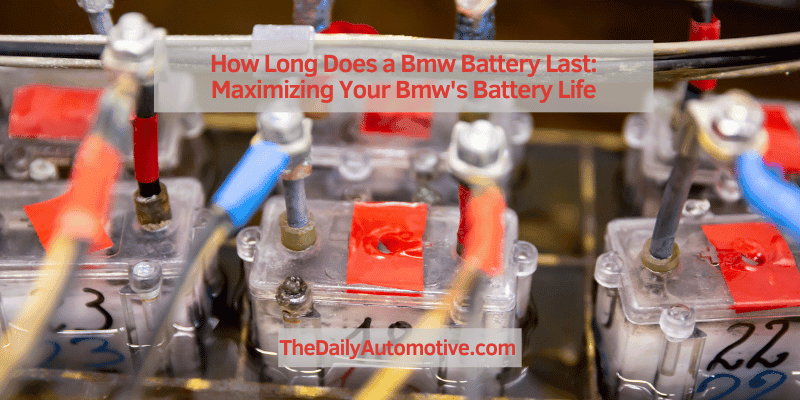How Long Does a Bmw Battery Last: Maximizing Your Bmw’s Battery Life
A BMW battery typically lasts for about 5 to 7 years. Factors impacting battery life include driving habits and climate.
Your BMW’s battery life is a critical consideration for vehicle maintenance. Batteries can typically last anywhere from 5 to 7 years, but several factors, such as weather and driving habits, can influence their lifespan. Whether you drive frequently, take short trips, or experience extreme weather conditions, these can all impact the longevity of your BMW battery.
Understanding these factors will help you effectively manage your vehicle’s maintenance and avoid unexpected battery replacements. We will explore the typical lifespan of a BMW battery, factors affecting its longevity, warning signs of a failing battery, and important maintenance tips to ensure your BMW’s battery functions optimally.
The Importance Of Your Bmw’s Battery
Batteries are an essential component of your BMW’s electrical system, providing the necessary power to start the engine and supply energy to numerous electrical components. A well-maintained battery plays a crucial role in the overall performance and reliability of your vehicle. Understanding the importance of your BMW’s battery and its impact on vehicle performance and the electrical system is vital for every BMW owner.
Impact Of Battery Life On Vehicle Performance
Your BMW’s battery life directly affects the performance of your vehicle. A healthy battery ensures seamless starting of the engine, efficient power supply to electrical components, and assures consistent performance of various systems such as the ignition, fuel injection, and engine management. On the other hand, a degraded battery can lead to slow cranking, electrical system malfunctions, and even affect the performance of safety features, such as the airbags and ABS system. Regular inspection and maintenance of your BMW’s battery are essential to prevent any adverse impact on vehicle performance.
Role Of The Battery In The Electrical System
The battery serves as the primary source of power for the entire electrical system of your BMW. It supplies electricity to the starter motor to initiate the engine, and also powers the vehicle’s lights, audio system, navigation, and numerous other electrical components. Moreover, the battery plays a significant role in stabilizing the voltage across the electrical system, preventing voltage fluctuations that can lead to irregular operation of various electronic control units. Ensuring the health of your battery, including regular testing and potential replacement when necessary, is crucial in maintaining the overall reliability and performance of your BMW’s electrical system.
Understanding The Lifespan Of A Bmw Battery
Learn all about the lifespan of a BMW battery. Understand the factors that affect its longevity, and discover how long a BMW battery typically lasts. Discover helpful tips to extend the life of your BMW battery and ensure its optimal performance.
The lifespan of a BMW battery is a key concern for many car owners, as a failing battery can lead to a host of issues. Factors such as weather conditions, driving habits, and vehicle age can impact the longevity of your BMW battery. Here, we will delve into the critical factors that affect the battery’s lifespan and provide insight into the typical lifespan of a BMW battery.
Factors Affecting Battery Longevity
Several factors can influence the lifespan of your BMW battery. Understanding these factors can help you take proactive steps to maximize your battery’s longevity.
- Weather: Extreme temperatures, both hot and cold, can accelerate battery deterioration.
-
Driving habits: Frequent short trips and stop-and-go driving can strain the battery, leading to a shorter lifespan.
-
Vehicle age: As a vehicle ages, its battery may also deteriorate, especially if it’s subjected to harsh driving conditions.
-
Maintenance: Regular maintenance, such as checking and cleaning battery terminals, can prolong the battery’s life.
Typical Lifespan Of A Bmw Battery
The typical lifespan of a BMW battery can vary depending on various factors. On average, a BMW battery can last anywhere between 4 to 6 years. However, this can be influenced by the factors mentioned above, and some BMW batteries may need replacement sooner.
It’s important to monitor the health of your BMW battery regularly and be proactive in replacing it when signs of deterioration become apparent. By understanding the factors that affect battery longevity and being attentive to the signs of a failing battery, you can ensure the continued reliability of your BMW.

Signs Of A Failing Bmw Battery
Do you have a BMW and wonder how long the battery will last?
Recognizing symptoms of a weakening battery is crucial for preventing unexpected breakdowns and for maintaining the overall health of your vehicle. Over time, a car battery, including a BMW battery, will deteriorate and show signs of wearing out. It is essential to be aware of these signs so that you can address any issues before they escalate.
Recognizing Symptoms Of A Weakening Battery
When it comes to your BMW battery, there are certain signs that can indicate it is starting to fail. If you notice any of the following symptoms, it may be time to consider battery replacement:
- Slow engine crank
- Dashboard warning lights
- Corrosion around the battery terminals
- Dimming headlights
- Electrical issues
Impact Of Battery Deterioration On Vehicle Functionality
In addition to the inconvenience of a failing battery, the deterioration of your BMW’s battery can have a significant impact on the functionality of your vehicle. If left unaddressed, a weakened battery can lead to:
- Unreliable engine starting
- Diminished electrical system performance
- Compromised performance of electronic components
- Increased strain on the alternator and other components
Maintaining Your Bmw’s Battery For Longevity
Best Practices For Preserving Battery Life
When it comes to extending the life of your BMW’s battery, there are several best practices that can help preserve its longevity. Here are some tips to keep your BMW’s battery running efficiently:
- Drive your BMW regularly: Regular use helps the battery to recharge and maintains its overall health.
- Avoid short trips: Short trips can lead to insufficient charging, impacting the battery’s lifespan.
- Use electronics wisely: Minimize the use of electronic accessories when the engine is off to reduce drain on the battery.
- Keep the battery clean: Regularly inspect the battery for dirt and corrosion, and clean it as necessary to prevent performance issues.
Routine Maintenance Tips For Optimal Performance
Proper maintenance is crucial for the optimal performance of your BMW’s battery. Here are some routine maintenance tips to ensure its longevity:
- Check battery terminals: Inspect the battery terminals for signs of corrosion and ensure they are securely connected.
- Test the battery: Regularly test the battery’s voltage and overall condition to identify any potential issues early on.
- Keep it charged: If you don’t drive your BMW regularly, consider using a battery maintainer to keep the battery charged.
- Monitor electrolyte levels: For non-sealed batteries, check and maintain the electrolyte levels as per the manufacturer’s recommendations.
Maximizing Your Bmw Battery’s Lifespan
A BMW battery typically lasts between 5 to 7 years, depending on factors such as driving habits, weather conditions, and maintenance. To ensure that your BMW battery reaches its maximum lifespan, it’s essential to implement advanced charging techniques and drive smartly to preserve the battery’s health and performance.
Utilizing Advanced Charging Techniques
To extend the life of your BMW battery, consider implementing advanced charging techniques such as:
- Investing in a quality battery charger: Opt for a charger with an automatic shut-off feature to prevent overcharging and maintain the battery’s optimal condition.
- Using a trickle charger: When storing your BMW for an extended period, connect a trickle charger to keep the battery charged and prevent it from losing power.
- Avoiding deep discharges: Regularly charge your BMW battery to prevent deep discharges, which can negatively impact the battery’s lifespan.
Implementing Smart Driving Habits For Battery Preservation
To preserve your BMW battery’s lifespan while driving, consider incorporating the following smart driving habits:
- Reducing electrical usage: Minimize the usage of electrical accessories such as heated seats, air conditioning, and infotainment systems to lessen the strain on the battery.
- Avoiding frequent short trips: Long periods of idling and short trips can lead to the battery not fully recharging, impacting its longevity.
- Regularly checking battery connections: Ensure that the battery terminals are clean and properly connected to maintain efficient power flow and prolong the battery’s lifespan.
Frequently Asked Questions On How Long Does A Bmw Battery Last
How Long Does A Bmw Battery Last On Average?
A BMW battery typically lasts 4 to 6 years, but it can vary based on driving conditions and maintenance. Extreme temperatures and short trips may shorten its lifespan.
What Factors Can Affect A Bmw Battery’s Lifespan?
Several factors impact a BMW battery’s longevity, including climate, driving habits, vehicle age, and electrical loads. Regular maintenance and proper charging habits can help extend its life.
How Can I Maximize The Lifespan Of My Bmw’s Battery?
To prolong your BMW battery’s life, avoid frequent short trips and extreme temperatures. Keep the battery clean, secure, and well-connected. Routine inspections and proper charging are also crucial for longevity.
Conclusion
Understanding the lifespan of a BMW battery is crucial for proper maintenance. By knowing the factors that affect battery longevity and following regular inspections and maintenance, you can ensure that your BMW battery lasts as long as possible. This proactive approach can save you time, money, and hassle in the long run.







